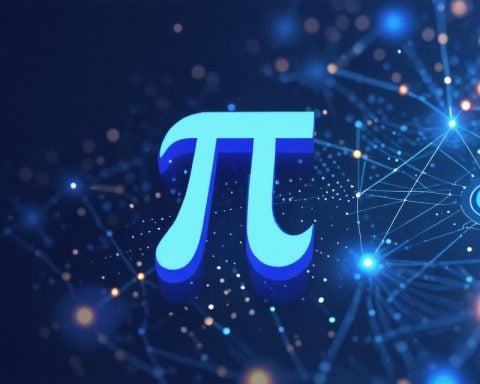Understanding Quantum Causality Limitations
In an exciting development, physicists have introduced a groundbreaking theoretical framework addressing the constraints that classical space-time imposes on quantum processes. This framework sheds light on the enigmatic phenomenon known as quantum indefinite causal order (ICO), which has captivated scientists’ attention due to its potential applications in advanced quantum technologies.
In contrast to our everyday experience of time, where the sequence of events is clear-cut, quantum ICO allows for a perplexing situation where events can exist in a superposition of orders. This creates a fascinating paradox, as it challenges our conventional understanding of causality. Despite experimental demonstrations of ICO, some physicists remain skeptical about its laboratory observations due to its clash with classical space-time definitions.
Researchers V Vilasini and Renato Renner have made significant strides by identifying specific conditions under which ICO processes can exist within classical space-time, framed as a no-go theorem. This theorem builds on historical principles, similar to Bell’s theorem, which underscored the non-classical nature of quantum entanglement.
Their findings demonstrate that ICO processes can occur without the necessity of locality, indicating that certain quantum events can interact freely without being confined to fixed positions in space. By exploring concepts like cyclicity versus acyclicity, the team proposes that classical analogies can unravel complex causal structures into clearer, acyclic sequences.
This fascinating research, published in Physical Review Letters and Physical Review A, not only enhances theoretical perspectives but also hints at significant advancements in quantum technology, paving the path for future explorations in quantum gravity and causality.
Deciphering Quantum Causality: Implications for Humanity and Technology
Quantum mechanics, with its inherent complexities and paradoxes, continues to challenge our understanding of the universe. Recently, physicists have opened new avenues for inquiry by exploring quantum indefinite causal order (ICO), a concept that disrupts traditional notions of time and causality. This exploration has profound implications for technology, the environment, and our understanding of reality itself.
One of the most significant implications of this research lies in its potential application in quantum computing and communications. The nature of ICO allows for superior information processing, where the order of operations can exist in a state of superposition. This means that quantum computers could solve problems and execute algorithms at speeds far beyond classical computers, essentially revolutionizing fields such as cryptography, materials science, and pharmaceuticals. The ability to process information more efficiently not only boosts economic growth but also fosters innovation that could lead to solutions for pressing global challenges.
Moreover, the advancements driven by quantum technology have the potential to impact energy consumption. Quantum computers promise to optimize various processes, including energy grids and resource allocation, thus contributing to more sustainable practices. In a world where climate change poses an existential threat, harnessing quantum computing to improve efficiencies could significantly reduce our carbon footprint, leading to a healthier planet for future generations.
The interdisciplinary nature of this research also highlights the intricate ties between physics and other fields, including environmental science and social dynamics. Consider the implication of ICO on our approach to problem-solving. By accepting that outcomes can be non-linear and interconnected, we may develop more integrated strategies in addressing complex global issues such as poverty, health crises, and environmental degradation. Acknowledging the diverse causal relationships in these issues can enhance collaborative efforts, leading to more holistic solutions.
As we venture deeper into the future, the understanding and applications derived from quantum ICO will shape fundamental aspects of humanity’s trajectory. The advancements in technology fueled by quantum studies may ultimately redefine our interactions with each other and with our environment. We could witness a future where sustainable technologies flourish alongside smarter communication networks, facilitating global cooperation essential for tackling climate change.
In conclusion, as researchers like V. Vilasini and Renato Renner unveil the mysteries surrounding quantum causality, we find ourselves at the precipice of a new era. The evolution of quantum technologies promises not only to reshape economies but also to influence the very fabric of societal interactions and environmental stewardship. By embracing the complexities and potentials of quantum mechanics, humanity may forge a path toward a more sustainable, interconnected future.
The Paradox of Quantum Indefinite Causal Order: Unlocking New Quantum Technologies
Understanding Quantum Causality Limitations
Recent advancements in quantum physics have led to the development of a theoretical framework that tackles the limitations classical space-time imposes on quantum processes, particularly focusing on the phenomenon known as quantum indefinite causal order (ICO). Unlike the linear progression of time we experience in our daily lives, quantum ICO proposes that events can exist in a superposition of orders, fundamentally challenging our understanding of causality.
Key Features of Quantum Indefinite Causal Order
Quantum ICO allows for a scenario where the sequence of operations or events is not fixed, meaning that two events may occur in different orders simultaneously. This could lead to breakthroughs in quantum computing and communication, as systems utilizing ICO could perform tasks in ways that classical systems simply cannot.
Scientific Foundations and Contributions
V Vilasini and Renato Renner’s recent research provides pivotal insights into ICO by unveiling specific conditions for its existence within traditional space-time frameworks. Their work resonates with revolutionary concepts like Bell’s theorem, which exposed the non-local nature of quantum phenomena. They assert that ICO processes do not require locality; thus, quantum entities can engage with one another freely without being restricted by spatial constraints.
Use Cases and Implications
The implications of ICO research extend across various fields:
– Quantum Computing: ICO has the potential to enhance computational power beyond conventional capabilities by enabling parallel processing of information.
– Quantum Communication: ICO could lead to more secure communication protocols by allowing for unpredictable arrangements of operation sequences.
– Quantum Cryptography: The complexity introduced by ICO can strengthen encryption methods, making information even more secure and resistant to interception.
Pros and Cons of Quantum ICO
Pros:
– Enhanced Efficiency: potential to increase the speed and efficiency of quantum computing operations.
– Causality Flexibility: enables new quantum logic that could revolutionize algorithm design.
Cons:
– Complexity: The theoretical framework can be complex to apply practically, presenting challenges for experimental validation.
– Skepticism: Some scientists doubt the feasibility of observing ICO in laboratory conditions due to its contentious nature compared to classical physics.
Limitations and Controversies
Despite the groundbreaking nature of ICO, several limitations and controversies surround its practical applications. The skepticism from parts of the scientific community stems from difficulties in replicating ICO effects in controlled settings. The theoretical foundation suggests scenarios that may not be straightforward to achieve with current technologies.
Future Directions and Predictions
Looking to the future, the ongoing exploration of quantum ICO is likely to spur innovations in both theoretical constructs and practical applications. The study could lead to significant advancements in quantum gravity, providing deeper insights into the nature of reality itself. Researchers predict that as experimental techniques improve, the practical application of ICO in quantum devices may become a reality, marking a new era in technology and fundamental physics.
For more insights into the evolving landscape of quantum physics and technology, visit Physical Review Letters for the latest research updates and findings.



















